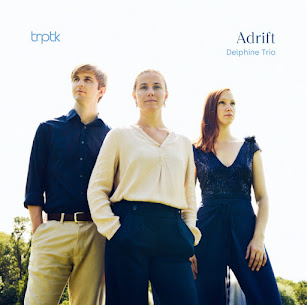The liner notes do not mention that it was premiered on 8 July
1975, during the Cheltenham Festival. The soloists were Gervase de Peyer, William
Pleeth and Peter Wallfisch.
Émigré composer Robert Kahn escaped from Germany in 1939, aged 73 years. He settled in the South of England. The present Serenade seems to exist in several incarnations: originally for oboe, horn and piano, but with alternatives for nine different instrumental combinations. The listener will enjoy this serene, occasionally melancholic, post-Brahmsian work which presents no challenges. It is presented in a single movement but subdivided into sections. Serenade was completed in 1923, whilst Kahn was living in Berlin.
John Psathas’s Island Songs is an attractive three-movement piece that explores traditional Greek dance music seen through the eyes of the composer. The liner notes explain that these include the “zeibekiko” and the “sirto.” There is an overall impression of “latent energy” even in the thoughtful slow movement. Various traditional Greek instruments are emulated, including the dulcimer and the stringed outi. It was originally written in 1995 for the Kadinsky Ensemble. It has been re-scored for string trio.
Astor
Piazzolla’s Oblivion has been arranged for multiple combinations of instruments.
The present version for clarinet, cello and piano was realized by Roelof Temmingh. It was devised for a performance of Pirandello’s
Enrico IV (1984). The liner notes do not explain this, but apparently it
is a slow milonga, which was a predecessor of the tango. It is
melancholic from the first note to the last.
Robert Delanoff is a new name to me. He was born in Trappau, Germany in 1942. He specialises in chamber music for “unusual instrumental combinations.” The present Trio, dating from 1965, explores an eclectic stylistic range. There are nods to Debussy, Hindemith and not a few hints of jazz. The liner notes are correct in pointing out the sense of humour in the final movement, a Scherzo. Yet the heart of the Trio is the melancholic, but extremely beautiful Nocturne.
I am always delighted to see a work by Mátyás Seiber featured on a new disc. His Introduction and Allegro was originally scored for cello and accordion. It is undated. The present arrangement, for clarinet, cello and piano was made by the composer. It displays all the excitement and vivacity exhibited by Seiber’s native Hungarian folk music.
The CD liner notes are adequate, however more details of each number would have been helpful. Dates of the works typically are not given.
The Delphine Trio features three musicians “from opposite ends of the globe”: Australian clarinettist Magdalenna Krstevska, Dutch cellist Jobine Siekman and Roelof Temmigh from South Africa. Their performances are outstanding throughout and they are clearly sympathetic to the repertoire. It is enhanced by a crisp, balanced recording.
This is an excellent debut album that serves its purpose by shining a light “on [some] beautiful hidden gems of the clarinet trio repertoire.”
Track Listing:
Kenneth Leighton (1929-88)
Fantasy on an American Hymn Tune, op.70 (1974)
Robert Kahn (1865-1951)
Trio Serenade, op.73 (1923)
John Psathas (b.1966)
Island Songs (1995)
Astor Piazzolla (1921-92)
Oblivion (1982) (arr. Roelof Temmingh (b.1946))
Robert Delanoff (b.1942)
Trio (1965)
Mátyás György Seiber (1905-60)
Introduction and Allegro (undated)
Delphine Trio: Magdalenna Krstevska (clarinet), Jobine Siekman (cello), Roelof Temmingh (piano)
rec. 26-29 June 2023, Studio 1, Muziekcentrum van de Omroep, Hilversum, Netherlands
TRPTK TTK0113 SACD
With thanks to MusicWeb International where this review was first published.

No comments:
Post a Comment